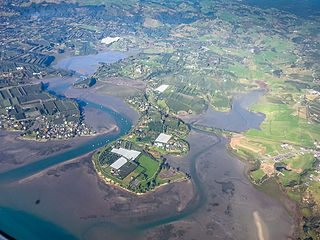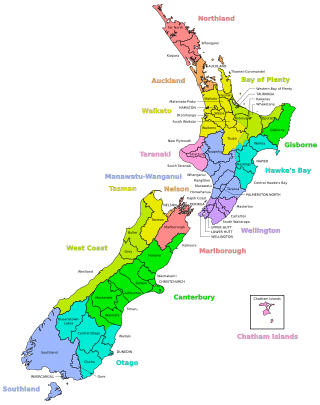
The Bay of Plenty Region, often abbreviated to BOP, is a region in the North Island of New Zealand situated around the body of water of the same name. The bay was named by James Cook after he noticed the abundant food supplies at several Māori villages there, in stark contrast to the earlier observations he had made in Poverty Bay.

Whakatāne is a town located in the Bay of Plenty Region in the North Island of New Zealand, 90 kilometres (56 mi) east of Tauranga and 89 kilometres (55 mi) northeast of Rotorua. The town is situated at the mouth of the Whakatāne River. The Whakatāne District is the territorial authority that encompasses the town, covering an area to the south and west of the town, excluding the enclave of Kawerau District.

Triennial elections for all 74 cities, districts, twelve regional councils and all district health boards in New Zealand were held on 9 October 2004. Most councils were elected using the first-past-the-post method, but ten were elected using the single transferable vote (STV) method. It was the first time that the STV method was available; the change came through successful lobbying by Rod Donald.

Triennial elections for all 73 cities and districts, twelve regional councils and all district health boards (DHBs) in New Zealand were held on 13 October 2007. Most councils were elected using the first-past-the-post voting method, but eight were elected using single transferable vote.

Rotorua Lakes District or Rotorua District is a territorial authority district in the North Island of New Zealand. It has one urban area of significant size, the city of Rotorua. The district is governed by Rotorua Lakes Council, which is headquartered in Rotorua and is headed by a mayor. The district falls within two regional council areas, with the majority of the area and Rotorua city in the Bay of Plenty Region and the rest in the Waikato region. Tania Tapsell has been the mayor of Rotorua since the 2022 local elections.

Bay of Plenty is a New Zealand electoral division returning one member to the New Zealand House of Representatives. The current representative is Tom Rutherford of the National Party, first elected at the 2023 election.

Rotorua is a New Zealand parliamentary electorate, returning one Member of Parliament to the New Zealand House of Representatives. It was first established in 1919, and has existed continuously since 1954. The current MP for Rotorua is Todd McClay of the National Party, who won the electorate in the 2008 general election from incumbent Labour MP Steve Chadwick.

The Rangitikei District Council is the local government authority for Rangitikei District in New Zealand. It is a territorial authority elected to represent the 16,300 people of Rangitikei. Since October 2013, the Mayor of Rangitikei is Andy Watson, who succeeded Robert "Chalky" Leary. The council consists of a mayor who is elected at large, and 11 councillors elected across five wards, one of whom gets chosen as deputy mayor. There are also two community boards – for Rātana and Taihape. The councillors are elected under the first-past-the-post (FPTP) system in triennial elections.
Toi Ohomai Institute of Technology is a New Zealand tertiary education institute with campuses in Rotorua, Tauranga, and other towns in the Bay of Plenty and South Waikato regions. It was formed in May 2016 after the amalgamation of Bay of Plenty Polytechnic and Waiariki Institute of Technology. Toi Ohomai is the third largest of the 16 ITPs in New Zealand.

The Mayor of Tauranga is the head of the municipal government of Tauranga, New Zealand, and presides over the Tauranga City Council. There is currently no Mayor of Tauranga. On 9 February 2021, a Crown Commission appointed by the Minister of Local Government took over all of the council's governance responsibilities, including the vacant position of Mayor. Tenby Powell resigned as Mayor in November 2020.

A district in New Zealand is a territorial authority area governed by a district council as a second-tier of local government in New Zealand, below regional councils. They were formed as a result of the local government reforms in 1989. There are 53 districts in New Zealand, and they do not include the 12 city councils, the Auckland Council, and the Chatham Islands Council. District councils serve a combination of rural and urban communities, while city councils administer the larger urban areas. Three districts are unitary authorities also performing the functions of a regional council.

New Zealand has a unitary system of government in which the authority of the central government defines sub-national entities. Local government in New Zealand has only the powers conferred upon it by the New Zealand Parliament. Under the Local Government Act 2002, local authorities are responsible for enabling democratic local decision-making and promoting the social, economic, environmental, and cultural well-being of their communities, as well as more specific functions for which they have delegated authority.
The mayor of Whakatāne is the head of the municipal government in Whakatāne District, New Zealand. The mayor presides over the Whakatane District Council, which was first formed in 1976 following an amalgamation, with further changes taking place in 1989.
The 2013 Wellington local elections were part of the 2013 New Zealand local elections, to elect members to sub-national councils and boards. The Wellington elections cover one regional council, eight territorial authority councils, three district health boards, and various community boards and licensing trusts.

The 2019 New Zealand local elections were triennial elections to select local government officials and district health board members. Under section 10 of the Local Electoral Act 2001, a "general election of members of every local authority or community board must be held on the second Saturday in October in every third year" from the date the Act came into effect in 2001, meaning 12 October 2019.

Whakatāne District is a territorial authority district on the North Island of New Zealand. The Whakatāne District Council is headquartered in the largest town, Whakatāne. The district falls within the Bay of Plenty Region. Victor Luca has been the mayor of Whakatāne since the 2022 local elections.

The Bay of Plenty District Health Board was a district health board with the focus on providing healthcare to the Bay of Plenty area of New Zealand. In 2022, the Bay of Plenty DHB was dissolved as part of a national overhaul of the district health board system. Its former functions and responsibilities were assumed by Te Whatu Ora.
Māori wards and constituencies refer to wards and constituencies on urban, district, and regional councils in New Zealand that represent local constituents registered on the Māori parliamentary electoral roll vote. Like Māori electorates within the New Zealand Parliament, the purpose of Māori wards and constituencies is to ensure that Māori are represented in local government decision making.

The 2022 New Zealand local elections were triennial elections held in New Zealand on Saturday 8 October 2022. Voting began by postal vote on 16 September and ended at noon on 8 October 2022.
The 2022 Wellington Region local elections were held on 8 October 2022 as part of the wider 2022 New Zealand local elections to elect members to sub-national councils and boards. These elections covered one regional council, eight territorial authorities, and various community boards and licensing trusts.








